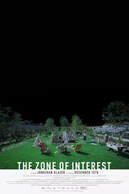
Zone of Interest seems like a simple film on the outside. It is divided into three sections by full colored shots of Black, White, and Red (the Nazi flag colors). The first (black) shows the seemingly ordinary life of the SS officer and his family. Their aspirations, desires, weekends. The second section (white) takes us deeper and shows the evil side of the "normal" SS officer and his job duties, worries, and the true nature of evil.
The third section is the aftermath of the Nazi regime. The third section takes the form of a flash-forward. Offered the chance to go back to Auschwitz to continue his efficient program of killing Jews, commandant Hoss has a bodily reaction. His body attempts to vomit, but nothing comes out of it, just a dry spit. Does he have a conscience? Is his body trying to tell him that he is tired of the killings? Is he trapped in the system that has engulfed him without a chance to escape alive? Or maybe his body is giving up, but his mind continues the course of destruction and hatred.
The best I can describe is that the Banality of Evil meets the Inevitability of Life. Evil is committed casually daily, just behind the wall. You don't see it, but it permeates the air. You don't see it, but it is in your house. You don't see it, but you are part of it. And yet, you cannot stop life. Your life and its mundane daily tasks. Your children's life and their anxiety take the form of a wandering girl at night. Your garden's life. Oh, the garden. Why the garden? Because the garden in the film is a metaphor. The beautiful flowers are the Nazis, and the beautiful arrangement in the garden is reminiscent of their seemingly always impeccable uniforms. The weeds are the Jews. The weeds that the wife so adamantly removes. The garden is the focal point of the film as well. Why? Because Hoss, the SS commandant, is known for the introduction of pesticides in the gas chambers of Auschwitz.
3.5 / 5
Director: Jonathan Glazer
Starring: Christian Friedel, Sandra Huller, Johann Kartha
The best I can describe is that the Banality of Evil meets the Inevitability of Life. Evil is committed casually daily, just behind the wall. You don't see it, but it permeates the air. You don't see it, but it is in your house. You don't see it, but you are part of it. And yet, you cannot stop life. Your life and its mundane daily tasks. Your children's life and their anxiety take the form of a wandering girl at night. Your garden's life. Oh, the garden. Why the garden? Because the garden in the film is a metaphor. The beautiful flowers are the Nazis, and the beautiful arrangement in the garden is reminiscent of their seemingly always impeccable uniforms. The weeds are the Jews. The weeds that the wife so adamantly removes. The garden is the focal point of the film as well. Why? Because Hoss, the SS commandant, is known for the introduction of pesticides in the gas chambers of Auschwitz.
3.5 / 5
Director: Jonathan Glazer
Starring: Christian Friedel, Sandra Huller, Johann Kartha
 RSS Feed
RSS Feed